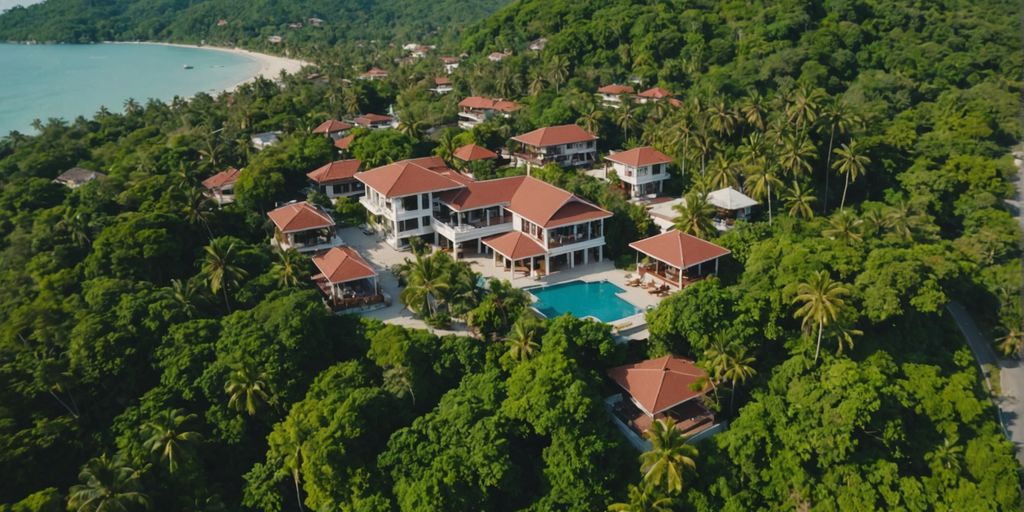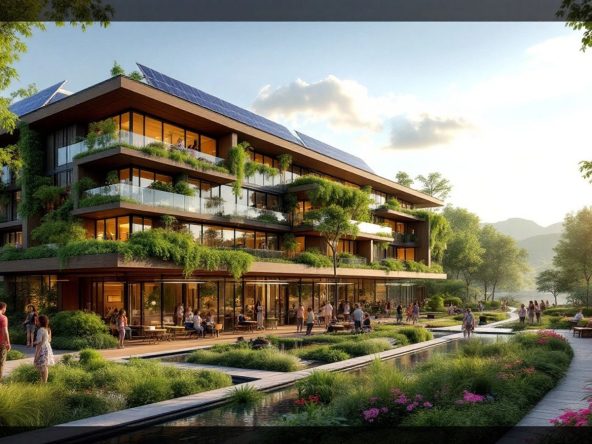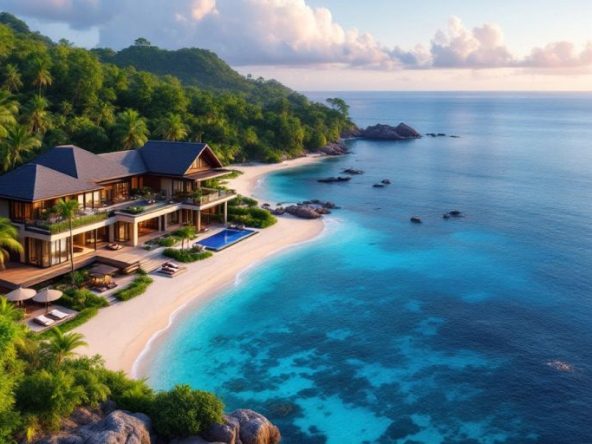The Samui real estate market is poised for significant growth in 2024, driven by several key factors. Experts predict that the market will continue to grow steadily, with property prices expected to rise by an average of 5-7% annually. This makes Samui a lucrative investment opportunity for both local and international investors.
Key Takeaways
- The Samui real estate market is expected to grow steadily in 2024, with property prices projected to rise by 5-7% annually.
- A variety of property types are available for investment, including luxury villas, affordable condos, and commercial properties.
- Key areas to invest in include popular tourist zones, emerging neighborhoods, and beachfront properties.
- Legal considerations are crucial, including understanding property ownership laws and obtaining necessary documentation.
- Investing in Samui real estate presents a unique opportunity to diversify your portfolio and capitalize on the island’s growth potential.
Market Growth Projections for 2024
Expected Annual Price Increase
The Samui real estate market is anticipated to experience notable growth in 2024. Experts forecast an average annual price increase of 5-7%, making it a lucrative opportunity for investors. This steady rise in property values underscores the market’s potential for substantial returns.
Key Economic Drivers
Several economic factors are driving this growth, including Thailand’s projected GDP increase of 3% annually over the next five years. Additionally, the rise of luxury real estate and eco-friendly homes is attracting wealthy overseas buyers and tourists interested in sustainability.
Impact of Tourism on Property Values
Tourism continues to be a significant driver of the Samui real estate market. The demand for short term rentals is particularly high, contributing to the overall increase in property values. The island’s natural beauty and appeal as a luxury tourist destination further bolster this trend.
The Samui real estate market is poised for significant growth in 2024, driven by several key factors. This makes Samui a lucrative investment opportunity for both local and international investors.
Types of Properties for Investment
Koh Samui offers a diverse range of properties for investment, each catering to different investor preferences and goals. Understanding the unique benefits of each property type can help you make an informed decision and maximize your returns.
Key Investment Areas in Samui
Popular Tourist Zones
Koh Samui’s popular tourist zones are prime locations for real estate investment. Areas such as Chaweng, Lamai, and Bophut are well-known for their vibrant nightlife, beautiful beaches, and luxury resorts. Investing in these zones can yield high rental returns due to the constant influx of tourists. Properties here often include some of the Best Beach Villas and Luxury Villas For Sale in Thailand.
Emerging Neighborhoods
Emerging neighborhoods like Maenam and Bangrak are gaining attention from investors. These areas offer a mix of tranquility and development potential, making them ideal for those looking to invest in the future growth of the island. The Phuket Real Estate Market has shown similar trends, where early investments in emerging areas have led to substantial returns.
Beachfront Properties
Beachfront properties in Koh Samui are among the most coveted real estate assets. Locations such as Lipa Noi and Taling Ngam offer stunning ocean views and direct beach access. These properties are often considered the Best Luxury Villa investments due to their high appreciation rates and demand among affluent buyers. Owning a Luxury Villa In Thailand in these areas not only provides a luxurious lifestyle but also a solid investment opportunity.
Investing in Koh Samui real estate allows you to own a piece of tropical paradise while benefiting from a thriving market. The island’s natural beauty and well-developed infrastructure make it a prime destination for investors.
| Area | Key Features | Investment Potential |
|---|---|---|
| Chaweng | Vibrant nightlife, beautiful beaches | High |
| Lamai | Luxury resorts, tourist attractions | High |
| Bophut | Fisherman’s Village, dining options | High |
| Maenam | Tranquil, development potential | Medium |
| Bangrak | Emerging, close to airport | Medium |
| Lipa Noi | Stunning ocean views, beachfront | High |
| Taling Ngam | Direct beach access, luxury villas | High |
Investors should consider these key areas when looking to maximize their returns in the Samui real estate market. Understanding the unique characteristics and potential of each area can help in making informed decisions and achieving successful investments.
Legal Considerations for Investors
Navigating the legal landscape is essential for anyone looking to invest in Samui’s real estate market. Understanding property ownership laws is the first step. Foreign investors face significant restrictions, as they are generally not permitted to own land directly in Thailand. However, there are alternative methods to consider, such as long-term leases or setting up a Thai company to hold the property.
Property Ownership Laws
Foreign investors must be aware of the legal limitations on property ownership in Thailand. While direct land ownership is restricted, foreigners can own buildings or condominiums outright, provided that no more than 49% of the building is foreign-owned. Another common approach is to enter into a long-term lease agreement, typically lasting 30 years, with options to renew.
Necessary Documentation
Securing the necessary documentation is crucial for a smooth investment process. This includes obtaining a title deed, known as a Chanote, which is the most secure form of land ownership documentation in Thailand. Additionally, investors should ensure that all contracts are thoroughly reviewed and that due diligence is conducted to verify the property’s legal status.
Foreign Investment Regulations
Foreign investment regulations in Thailand are stringent. Investors must comply with the Foreign Business Act, which outlines the types of business activities that are restricted or prohibited for foreign entities. Engaging a legal expert can safeguard your investment and provide peace of mind. This includes drafting and reviewing contracts, conducting due diligence, and advising on the best ownership structures.
Engaging a legal expert can safeguard your investment and provide peace of mind.
Short-term rentals also require adherence to local regulations, including obtaining the necessary permits and ensuring compliance with zoning laws.
Financing Options for Property Investment
Investing in Samui real estate offers a unique opportunity to enter a thriving market in a tropical paradise. Various financing options are available to support your investment, including bank loans, private financing, and government incentives. Understanding these options can help you make informed decisions and maximize your returns.
Impact of Demographic Changes
Rising Expat Population
The rising expat population in Samui is a significant factor influencing the real estate market. Many expatriates are drawn to the island’s unique blend of modern amenities and traditional charm. This demographic shift has led to increased demand for both rental and purchase properties, particularly in areas offering seaside serenity in Lamai. The influx of expatriates often brings higher purchasing power, which can drive up property values.
Local Population Trends
Local population trends also play a crucial role in shaping the real estate market. A growing local population can lead to increased demand for housing, thereby impacting property prices. Additionally, improvements in local infrastructure and amenities can make certain areas more attractive to both locals and expatriates.
Tourism Demographics
Tourism demographics are another critical aspect to consider. The type of tourists visiting Samui—whether they are short-term visitors or long-term stayers—can significantly affect the demand for different types of properties. For instance, areas popular with tourists often see higher demand for rental properties, which can be a lucrative investment opportunity. The dual investment potential of properties in tourist hotspots, such as beachfront villas, is particularly noteworthy.
Market Dynamics and Trends

The real estate market in Samui is shaped by a variety of factors, including supply and demand, seasonal variations, and global real estate trends. Understanding these dynamics is crucial for making informed investment decisions.
Supply and Demand
The balance between supply and demand significantly impacts property values in Samui. A surge in demand, often driven by tourism and an increasing expat population, can lead to higher property prices. Conversely, an oversupply of properties may result in price stagnation or decline. Investors should monitor these trends closely to identify optimal buying and selling opportunities.
Seasonal Variations
Samui’s real estate market experiences notable seasonal fluctuations. The high tourist season, typically from December to April, sees increased demand for rental properties, driving up prices. In contrast, the low season may offer more favorable conditions for buyers looking to negotiate better deals. Understanding these seasonal patterns can help investors time their market entry and exit strategies effectively.
Influence of Global Real Estate Trends
Global real estate trends also play a role in shaping Samui’s market. Economic conditions, changes in government policies, and shifts in cultural preferences can all influence local property values. For instance, the growing awareness and preference for eco-friendly and sustainable living have led to increased interest in properties with features like solar panels and natural ventilation. Staying informed about these global trends can provide valuable insights for making strategic investment decisions.
Risks and Challenges in the Market
Economic Fluctuations
The Samui real estate market is not immune to economic fluctuations. Changes in Thailand’s economic stability or shifts in global economic conditions can significantly impact property values and investment interest. For instance, political instability in Thailand could lead to a slowdown in the market, causing potential drops in property values.
Regulatory Changes
Investors must stay informed about regulatory changes that could affect their investments. Thailand’s property laws and regulations can evolve, potentially impacting foreign ownership rights and investment conditions. Staying updated with these changes is crucial to avoid any legal complications.
Environmental Concerns
Environmental concerns, such as overdevelopment, pose a significant risk to Samui’s natural beauty. Overdevelopment can lead to environmental degradation, which may reduce the island’s appeal to tourists and investors alike. Additionally, the risk of property damage due to tropical storms and monsoons is a critical factor to consider.
Investing in Koh Samui’s real estate market offers unique opportunities, but like any investment, it comes with its own set of risks and rewards.
Limited Infrastructure
Certain areas in Samui have limited access to public utilities and infrastructure. This can pose challenges for property development and maintenance. Investors should carefully evaluate the infrastructure availability in their chosen investment areas.
Cultural and Language Barriers
Potential language barriers and cultural differences may lead to misunderstandings during transactions. It is advisable for foreign investors to seek local legal assistance to navigate these challenges effectively.
Financing Challenges
Foreign property buyers often face challenges in securing financing in Thailand. Unfamiliarity with local financing options, limitations, and additional conditions can complicate the investment process. It is essential to thoroughly research and understand the financing options available to avoid any financial pitfalls.
Strategies for Successful Investment

Developing a robust investment strategy is essential for maximizing returns in the Samui property market. Thorough research and legal assistance are crucial to ensure a successful and profitable investment. By aligning your strategy with current market trends and leveraging the island’s economic stability, you can secure a lucrative and rewarding investment in this tropical paradise.
Comparative Analysis with Other Markets
Lessons from Phuket
Phuket’s real estate market offers valuable insights for investors in Samui. Both markets are heavily influenced by tourism, but Phuket has a more mature market with higher property prices. Investors can learn from Phuket’s success in attracting high-end tourists and short term rentals, which has driven up property values. However, the market saturation in Phuket also serves as a cautionary tale for Samui.
Insights from Bangkok
Bangkok’s real estate market is characterized by its urban density and diverse property types. Unlike Samui, which is more reliant on tourism, Bangkok benefits from a steady demand for residential and commercial properties. This diversity provides a buffer against market volatility. Investors in Samui can consider diversifying their portfolios to include a mix of property types to mitigate risks.
Global Market Comparisons
When comparing Samui to global markets, it’s evident that the island offers unique opportunities and challenges. For instance, the demand for eco-friendly properties is rising globally, and Samui is no exception. Investors should be aware of global trends such as sustainable development and the increasing popularity of short term rentals. These factors can significantly impact property values and investment returns.
Navigating this market requires a comprehensive understanding of both the opportunities and the potential challenges involved. By leveraging market insights and understanding key trends, investors can capitalize on the growth potential offered by Samui’s vibrant real estate landscape.
Future Outlook Beyond 2024
Long-term Growth Projections
Looking beyond 2024, the Samui real estate market is expected to maintain its upward trajectory. Experts predict a steady annual growth rate of 5-7% in property prices, driven by increasing demand from both local and international investors. The rise of luxury real estate and environment-friendly homes will continue to be strong niches, particularly appealing to wealthy overseas buyers and tourists with a vested interest in sustainability.
Potential Market Disruptors
Anticipated changes in government policies could significantly impact the market. For instance, any tightening of foreign property ownership rules or adjustments in taxation on real estate could dampen international investment. Additionally, environmental regulations may influence the types of properties that can be developed, potentially favoring eco-friendly homes.
Sustainable Development Initiatives
Sustainable development will play a crucial role in shaping the future of Samui’s real estate market. Upcoming residential projects are increasingly focusing on eco-friendly designs and sustainable practices. This trend is expected to attract a growing number of environmentally conscious investors.
The luxurious 4-bed beachfront villa in Koh Samui with open-plan living, private balcony, and serene surroundings is a prime example of the type of high-end, sustainable properties that will likely dominate the market in the coming years. Price: 26,500,000 THB. Contact for visit.
Conclusion
The Samui real estate market in 2024 presents a promising landscape for investors, driven by steady growth in property values and diverse investment opportunities. With property prices expected to rise by 5-7% annually, the market offers lucrative prospects for both local and international investors. Key areas such as popular tourist zones, emerging neighborhoods, and beachfront properties are particularly attractive. However, it is essential for potential investors to stay informed about market dynamics, legal considerations, and economic factors. Thorough research and legal assistance are crucial to navigating this evolving market successfully. By understanding the local market and leveraging the insights provided, investors can capitalize on the growth potential and achieve significant returns.




